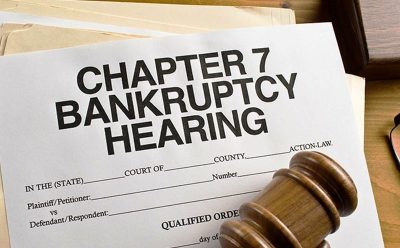- Lemberg Law
- Bankruptcy Law: Terms And Definitions
- FAQ About Bankruptcy
- What is Chapter 7 Bankruptcy?
Chapter 7 bankruptcy is a legal process for individuals to resolve outstanding debt by liquidating assets, paying creditors, and wiping the slate clean. Chapter 7 is available to those who meet income and asset eligibility requirements.

During a Chapter 7 bankruptcy proceeding, your bankruptcy trustee sells all of your nonexempt assets and pays your creditors according to the rules outlined in the law. At the end of the process, all of your remaining eligible debts are discharged, meaning that you no longer owe money to those creditors.
Can I File for Chapter 7 Bankruptcy?
Not everyone can petition for bankruptcy under Chapter 7. A law passed by Congress in 2005 places restrictions on those who are eligible to file. In order to be automatically eligible under Chapter 7, your monthly income has to meet or fall below your state’s median income.
Your monthly income is calculated as your average income in the six months prior to filing for bankruptcy. Income includes all of the money you make as an employee or business owner, interest and dividends, child and spousal support, unemployment and workers’ compensation, and disability and retirement income, among other sources of funds.
If your income exceeds the median income for your state, then you are subject to a “means test” to see if, after paying for necessities, you have money left over to repay some of those you owe. If so, the court will either dismiss your Chapter 7 filing or convert it to a Chapter 13 bankruptcy. Under Chapter 13, you are put on a repayment plan, and creditors or debt collectors can’t harass you or take you to court as long as you are making payments.
The means test involves completing a court form that asks for your current monthly income, the number of people you claim as exemptions on your federal tax return, and any other dependents you have. Next, you use Internal Revenue Service national standards to note the dollar amounts allotted for food, clothing, and other items, as well as your out-of-pocket healthcare allowance. Then, you use IRS local standards to report housing and utilities expenses, vehicle operation expense, and vehicle ownership or lease expense. You’re also required to enumerate other categories of expenses, such as taxes, court-ordered payments, childcare, education, and life insurance.
After reporting that kind of information, you are required to list secured debts, like mortgages and car loans, as well as past due tax, child support, or spousal support payments. From there, you can determine if you are eligible to file under Chapter 7 or, alternately, Chapter 13.
Are There Other Restrictions for Chapter 7?
Chapter 7 bankruptcy has several other restrictions. For example, you’re required to attend approved credit counseling prior to petitioning for Chapter 7. If you don’t go to credit counseling, you’re ineligible to file. If you’ve successfully completed Chapter 13 bankruptcy within the previous six years or Chapter 7 bankruptcy within the previous eight years, then you’re not allowed to file for bankruptcy again. Conversely, if the court dismissed your bankruptcy petition within the previous six months, you’re also ineligible to file.
Chapter 7 bankruptcy is an important tool that can give you a fresh start in rebuilding your financial well-being. The bankruptcy process is complicated, though, and is much easier to navigate when you have an experienced bankruptcy attorney by your side.
Have questions? Call us now at 855-301-2100 for a Free Case Evaluation.
Our services are absolutely FREE to you.
The harassing company pays our fees.